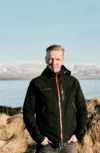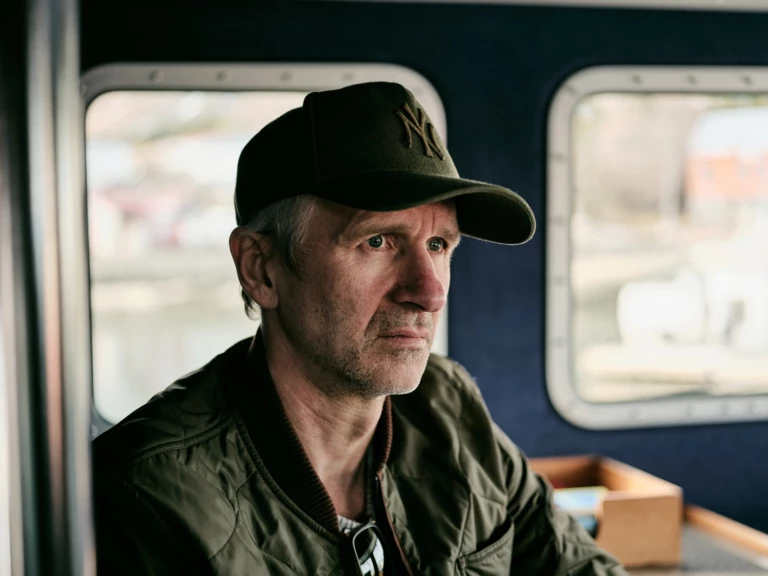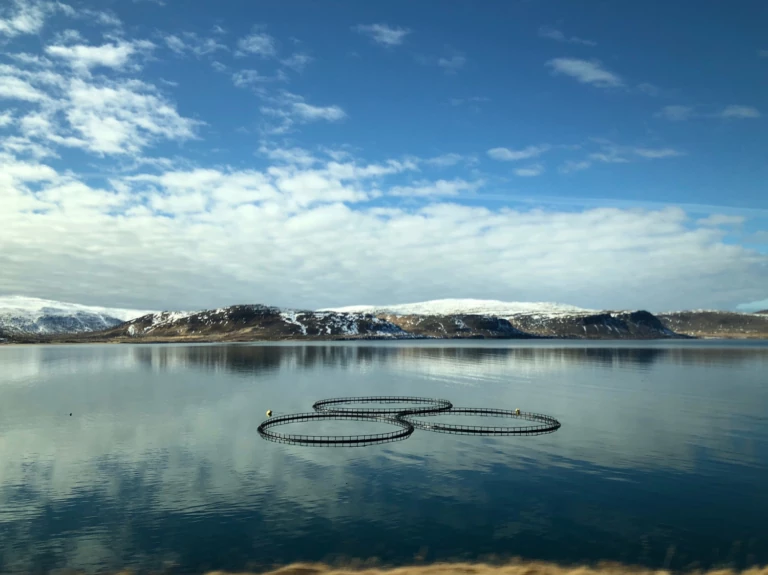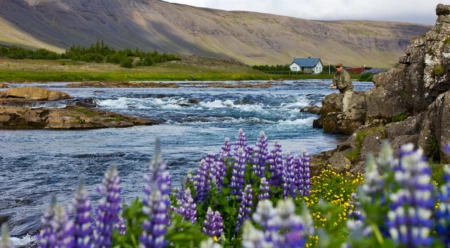Iceland, Open-Net Fish Farms, and the Final Frontier for Wild Atlantic Salmon
In the last 20 years, the expansion of salmon farming in open-net pens has led to the loss of half the wild salmon population in Norway. On average, 200,000 farmed fish escape from open-net pens and many of them swim up rivers in Norway and breed with wild stocks, contributing to species decline. According to conservation groups, the same method of farming is also responsible for the collapse in salmon and sea trout populations in the West Highlands and Islands of Scotland.
Open-net fish farms threaten the survival of wild fish including Atlantic salmon, sea trout and Arctic char, but governments are not doing enough to address the problem. Instead, the salmon farming industry (owned predominantly by Norwegian companies like SalMar and Norwegian Royal Salmon) is set to grow at alarming rates around Norway, Scotland and Ireland—and expand exponentially in the pristine fjords of Iceland.
Patagonia Europe has been supporting grassroots groups in Iceland to push back against the salmon farming industry and ask for a ban on open-net salmon farms in Iceland, Norway, Scotland and Ireland. Since the launch of the campaign, a new aquaculture bill just passed in Iceland with some urgently needed restrictions on salmon farming. This is a step forward for protecting wild fish and their habitat, but the further expansion of open-net pen usage by the industry poses a significant threat.
Ahead of the bill going through Parliament, the North Atlantic Salmon Fund (NASF) Iceland, the Icelandic Wildlife Fund (IWF) and other local groups put pressure on the Icelandic Parliament by recruiting 30 businesses to support the campaign and plastering Reykjavik with billboards.
We talked with Jón Kaldal from IWF and Fridleifur (Frid) Gudmundsson from NASF about the threat posed to communities and wildlife if Iceland expands open-net salmon farms and what the new aquaculture bill means to the future of Iceland’s fjords.

Fridleifur (Frid) Gudmundsson of the North Atlantic Salmon Fund on a press tour as part of the launch of the film Artifishal, in the West Fjords of Iceland. Open-net salmon farms could have devastating effect on wild salmon population and affect local communities who rely on fly-fishing tourism. Photo: Liz Seabrook
What is the state of the fish-farming industry in Iceland and how is it different than those in other parts of Northern Europe, like Norway?
Frid: It’s not different. The same Norwegian companies that are operating in Norway are operating here, too. Iceland hasn’t been suited for fish farming because it was considered too cold, but with the warming of the oceans, possibly due to issues such as climate change, it has become a more suitable place for the industry.
Jón: Iceland is the final frontier for wild Atlantic salmon. We don’t have large-scale aquaculture or fish farming in Iceland, but that could change soon. The fish-farming industry is relatively small now, but there are licenses going through the system that could eventually make Iceland a much bigger player in salmon farming. We have seen what has happened in Norway and Scotland, where the fish farming and aquafarming in open-net pens have almost decimated the wild stock.
Frid: More than a decade ago, the current government created areas in Iceland they said were designated for fish farming. All the fjords that are close to the big salmon rivers were closed, so you could only focus on these predetermined sectors in Iceland. Companies started applying for licenses under the radar because people weren’t thinking about fish farming at the time. And as these companies grew, people started noticing that this could be a problem. We started to hear reports about fish escaping from the farms and reports about sea-lice outbreaks and the use of pesticides in the ocean.
Jón: We have to realize that wild salmon is already in a hostile world created by humankind—pollution, dams, warming seas and so on. If we add open-net farms to this hostile environment, we could lose our wild stocks pretty quickly. It is a big responsibility for our generation.

Jón Kaldal of Icelandic Wildlife Fund on a boat visiting Iceland’s West Fjords. “We have to realize that wild salmon is already in a hostile world created by humankind.” Photo: Liz Seabrook
Could the expansion of open-net salmon farming impact local communities in Iceland?
Jón: Unemployment in Iceland has been low for several years now. Life is going well, and there is no urgent need to “create jobs”—what some politicians say as an excuse to bringing polluting industries into communities. If they introduce open-net pens on a large scale to Iceland, we will probably have to import workers to do the jobs. But in the long term, there is no guarantee these jobs will stay here, especially with technological advances that make it possible to feed fish by pushing a button in another country.
We also have the fly-fishing business, which has created jobs in the countryside of Iceland for decades. We know that farmers who have relied on selling licenses to anglers will definitely suffer if the wild stocks take a hit from the aquaculture industry. You have to protect the families in the countryside that rely on this income.
Frid: The fly-fishing industry is based on fishing wild fish. Anglers are not coming to Iceland to fish Norwegian-farmed salmon. It impacts the fly-fishing community, the people who run the fishing lodges and the staff who work on serving and guiding. You are taking away from one group and giving it to another, and that’s not right. At the same time, you are doing it at the cost of nature. To me, it’s unacceptable.
What would be the environmental impact to wildlife and the coast of Iceland if the salmon-farming industry expands using open-net pens?
Frid: Research on open-net farms in Norway shows farmed fish escape the nets. Farmed salmon is just like a domesticated farm animal—it has been bred, genetically modified or enhanced to grow quickly, similar to how chicken is farmed. A farmed chicken will not survive very well if it escapes; it is not adapted to that. The same can be said about Norwegian-farmed salmon.
When farmed fish escape—and I don’t know exact numbers of how many hundreds of thousands or millions of fish have escaped in Norway—their instinct is to find a river to breed in. It is imprinted in them. When they escape, they swim up the next river they can find and try to breed with wild fish. Wild fish have been adapting since the Ice Age; they have adapted for the river they are from, and their growth is based on the currents in that particular river. When the two breed, you get a hybrid that is ill equipped to survive in the wild, which ultimately leads to the decay of wild-salmon populations. Today, the scientific community (The International Council for the Exploration of the Sea) agrees that the largest single threat to wild Atlantic salmon is open-net salmon farming.
In Norway, we see that of all the rivers there have had genetic contamination. This is something we cannot have in Iceland because the stock here is small. It will only take one or two bad accidents for it to be catastrophic for our rivers. Add to this the sea-lice issue that goes back to wild fish and how baby fish swimming out to the ocean cannot survive it. Then add the waste and diseases that go onto the sea floor and kill everything around it. The list goes on and on.

Open net salmon pens in the West Fjords, operated by Norwegian/Icelandic company Arnarlax. Photo: Lisa Rose
Does the aquaculture bill that passed just a couple weeks ago in Iceland succeed in protecting fish and their habitat?
Frid: I definitely don’t think it goes far enough. But it is an improvement from what it was. For this bill, the Icelandic Marine Institute prepared a risk assessment based on how many farmed salmon will escape from open-net pens in one fjord and how much it will affect the rivers surrounding it. Based on this assessment, they have closed one of the biggest farms in the Westfjords where it is actually allowed to fish farm. The fish-farming industry has been furious about this.
Another win we see in the discussions leading up to the bill is the push for a lice-free fishing industry within the next four or five years. We have been campaigning for this because if you want to say “no open-net pen,” just say “lice-free” because open-net pens will never be lice-free, we know that.
We also managed to put in strong economic incentives for closed containment. Equipment for closed containment is more complicated and more expensive. This bill would put economic incentives in the legislation, which is something we haven’t seen before. That is a pretty big win for us. We want more environmentally friendly companies to come here to fish farm or to get the existing open-net pen industry to shift and move into closed containment as the technology evolves and gets better and better.
What are the next steps for the campaign to ban open-net salmon farming in Iceland now that this new bill has passed?
Jón: The bill was passed and should be revised no later than May 1, 2024. But the industry has already started working on getting the Icelandic Parliament to be more lenient. We need to take the fight up with the industry because we will absolutely not let them have their way in Iceland.
Frid: We will deliver the petition signatures we raised with the help of Artifishal to the Icelandic Parliament to challenge them to make stronger environmental requirements in their legislation. We will also continue to monitor the fish-farming industry very closely both through individuals getting reports from lease holders and river owners here in Iceland. The fish are running now, and we are letting the industry know that we are watching them. If anything happens, and we expect it will, we will make that as an example of farming that disregards the environment.
What can people do to help in Iceland and beyond?
Jón: We’ve been trying to raise awareness about this by asking restaurants not to serve salmon from sea pens and asking people not to buy salmon farmed in sea pens as it’s affecting wildlife. For people in Iceland, get in touch with local politicians. Talk to the officials who represent your area in Parliament and raise your concerns to protect nature and wildlife.
Frid: The most efficient way to help is to constantly question where your salmon is coming from. If you go to a grocery store or a restaurant, ask where the salmon is from and refuse to eat salmon produced in open-net pens. That’s a huge majority of the salmon industry. That’s the easiest way to do it.
If people want to get more involved, we’re always looking for funds and volunteers so we can do more because we are fighting a multi-million dollar industry. We keep going back to the story of “David and Goliath” because we are just a few people trying to make a difference. Meanwhile, the fish-farming industry hired the former speaker of the house the moment he walked out from his role. It’s a hard battle, and money is always helpful.
Protect wild fish habitat
Sign the petition asking for a halt to the devastation of wild fish and surrounding ecosystems caused by open net salmon farms in Iceland, Norway and Scotland.

